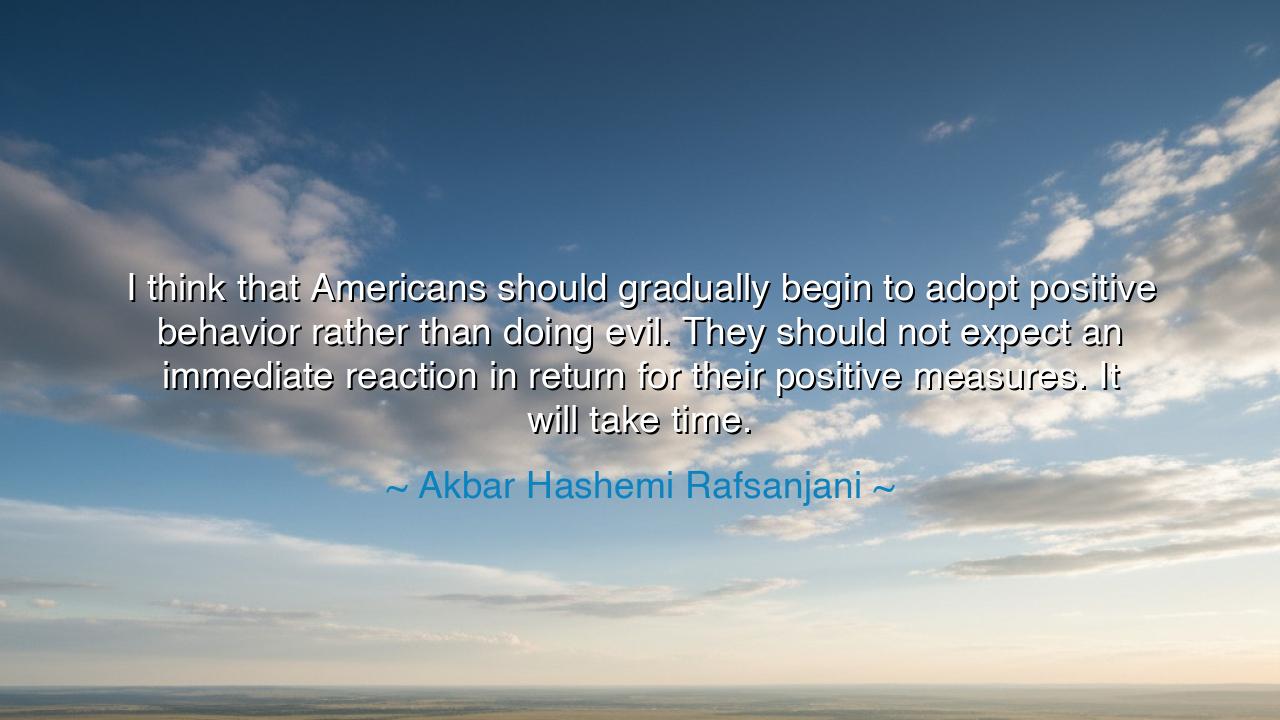
I think that Americans should gradually begin to adopt positive
I think that Americans should gradually begin to adopt positive behavior rather than doing evil. They should not expect an immediate reaction in return for their positive measures. It will take time.






The words of Akbar Hashemi Rafsanjani, “I think that Americans should gradually begin to adopt positive behavior rather than doing evil. They should not expect an immediate reaction in return for their positive measures. It will take time,” are spoken with the tone of both admonition and patience. In them lies a timeless lesson: that true change, whether in the soul of a man or the policy of a nation, is not born in haste but in steady transformation. To turn from evil to good requires endurance, for trust once broken cannot be rebuilt overnight.
In the ancient spirit, this truth echoes the laws of nature. A tree does not bear fruit the day it is planted, nor does a river cleanse itself at once after years of poison. Likewise, when a nation known for force and domination seeks to embrace positive behavior, it must endure suspicion, doubt, and the slow healing of wounds it inflicted. Rafsanjani calls for recognition of this slow path, reminding us that virtue is proven not in sudden gestures, but in perseverance over time.
History bears witness in the story of post-war Germany. After the fall of the Third Reich, the nation could not expect that its neighbors or the world would immediately trust it again. Decades of humility, rebuilding, and commitment to peace were required before it was welcomed back as a partner among nations. This is the very lesson Rafsanjani underscores: that positive measures are seeds planted in soil hardened by history, and only through patience and persistence do they take root.
His words also serve as a warning against arrogance. Too often, great powers believe that a single act of charity, or a sudden withdrawal of aggression, should erase the memory of past wrongs. But those who have suffered remember. Trust must be earned slowly, through repeated acts of sincerity. The expectation of immediate gratitude is itself another form of evil, for it demands forgiveness without justice and healing without time.
So let this teaching endure: true positive behavior must be steady, humble, and patient. Nations and men alike cannot undo the past with a single deed, but through many deeds, faithfully carried out, they can reshape their future. Rafsanjani’s words stand as both counsel and challenge: abandon evil, embrace good, but do not demand reward. For only in the fullness of time does the world learn to believe in the sincerity of change.






HLhanh luu
Rafsanjani seems to be encouraging a shift in mindset towards long-term improvement rather than expecting quick fixes. But in a world that often rewards instant success, how can this message be effectively communicated? Is there a way to cultivate patience and consistency in a culture that often prizes short-term results? This could be a reminder that lasting change takes effort, but how do we inspire people to trust the process?
TQThuy Quynh
This quote strikes me as both optimistic and challenging. It’s easy to expect immediate results when we do something positive, but Rafsanjani emphasizes the need for patience and persistence. Is it fair to expect people, especially in a nation like the U.S., to change their behavior gradually? How do we deal with the frustration that often comes from seeing little change despite doing the right thing?
BCbao chau
I find this quote quite insightful, especially considering how often people expect quick results in today’s fast-paced society. Rafsanjani highlights the importance of consistency and long-term effort in doing good, which can be hard to embrace in a culture driven by immediate outcomes. But what happens when people grow impatient and give up on the process? How can we encourage more people to stay committed to positive actions even when they don’t see immediate results?
Nnguyen2009
Rafsanjani's quote seems to point out the need for patience in making positive changes. It’s a reminder that real progress, especially in terms of behavior and ethics, takes time and sustained effort. But in today’s world of instant gratification, can we afford to wait for those changes? Is it realistic to expect a slow, gradual shift, or do we need more immediate results to address pressing issues?